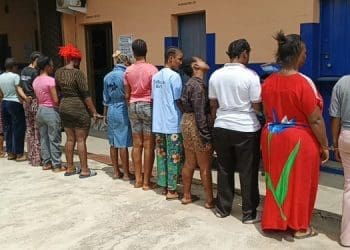The Ghana Health Service (GHS) has raised alarm over a sharp rise in influenza infections across parts of the country, urging the public to wear face mask and adhere to preventive health measures as seasonal flu cases surge.
In a statement signed by the Director-General of the Service, Dr. Samuel Akoriyea Kaba, the GHS confirmed the detection of Influenza A (H3N2 and H1N1) strains in the Greater Accra, Central, Bono, and Eastern Regions.
The strains, it said, are part of Ghana’s regular seasonal flu viruses that tend to spread more rapidly during the cooler months of the year.
According to the Service, the increase in flu cases coincides with Ghana’s annual influenza season, which typically peaks around this period, and has already begun putting pressure on some health facilities in the affected regions.
“The symptoms of the flu include sudden onset of fever, cough, sore throat, runny nose, body aches, headache, and fatigue,” the statement said, adding that the infection spreads mainly through respiratory droplets from coughing, sneezing, or talking, and through contact with contaminated surfaces.
Dr. Kaba cautioned that while most cases are mild, certain groups are at higher risk of developing severe complications. These include children and adolescents—particularly those in school—pregnant women, the elderly, and individuals with chronic medical conditions such as asthma, diabetes, and heart diseases.
The GHS assured the public that all necessary measures were being taken to manage and contain the outbreak. However, it emphasized that cooperation from the public and relevant institutions was critical to safeguarding communities.
“Schools, in particular, are high-risk environments for flu transmission,” the statement noted, urging school authorities, parents, and students to strictly adhere to preventive practices. These include ensuring proper ventilation in classrooms, encouraging sick students to stay home, and promoting hygiene education among pupils.
The Health Service further advised the public to seek early medical attention when experiencing flu-like symptoms and to avoid self-medication. It encouraged those who fall ill to stay home to minimize transmission within households, schools, and workplaces.
To curb the spread, the GHS recommended several preventive steps:
- Frequent handwashing with soap under running water.
- Avoiding crowded places whenever possible.
- Covering the mouth and nose when coughing or sneezing.
- Wearing face masks in crowded or poorly ventilated settings.
Dr. Kaba disclosed that the Service has enhanced surveillance and rapid diagnostic testing at health facilities nationwide to enable early detection and management of flu cases.
It has also updated clinical management protocols, intensified public education campaigns, and strengthened coordination with regional and district health directorates to ensure timely response to new cases.
He urged the public not to panic but to take the advisory seriously, noting that adherence to basic hygiene and preventive practices was the most effective way to reduce the spread of the virus.
“Ghana experiences influenza circulation every year, and while most cases are mild, collective vigilance and responsible health behaviour can prevent widespread transmission,” the statement concluded.
As the country braces for the peak of the flu season, health authorities say they remain on alert to prevent a wider outbreak — drawing lessons from the COVID-19 pandemic in promoting mask-wearing, hygiene, and community cooperation.















